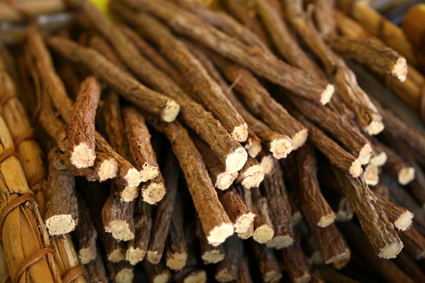| |
Licorice (Glycyrrhiza Glabra)
 |
The licorice plant is a native to southern Europe and central Asia. It gets its common name from a Greek word meaning "sweet root," an appropriate description for the herb that is said to be 50 times sweeter than sugar.
Nowadays, it is widely cultivated for the use in commercial products, such as making candies and for food flavorings.
Licorice has been used in traditional Chinese medicine for over 5,000 years and it is still prized today for its healing powers in contemporary Chinese medicine. In fact, it is the second most prescribed herb in China, exceeding only by the powers of ginseng.
Glycyrrhizin, one of the main components found in licorice, is believed to be responsible for many of its therapeutic properties. However, there are other potentially healing substances that have been identified in licorice as well, including compounds called flavonoids and various plant estrogens (phytoestrogens).
Benefits of Licorice Root
The health benefits of licorice root has been used for thousands years to treat a variety of aliments, including coughs, sore throats, food poisoning, and liver and stomach disorders. Indeed, this herb has been long valued as a demulcent to soothe and coat inflamed tissues of the mouth, throat, and digestive and urinary tracts.
In addition to its important uses as a demulcent, the herb acts as an expectorant, which has also been long valued. Glycyrrhizin, which is the main active ingredient in licorice root acts as an expectorant by loosing and thinning mucus and phlegm from the respiratory tract, making it easier to cough up. Glycyrrhizin also harbors anti-inflammatory properties.
Today, alternative health care professionals continue to use the benefits of licorice root to relieve respiratory ailments such as bronchitis, colds, coughs, congestion, sore throat, and allergies. In addition, it is used for stomach problems (including heartburn from reflux), inflammatory disorders, skin conditions (including eczema and psoriasis), minor skin infections, and liver problems.
Recent animal studies have shown that licorice root enhances immunity by boosting levels of interferon. Interferon is one of nature's most powerful antiviral agents -- it helps to keep viruses from reproducing as well as it simulates the activity of other beneficial immune cells. Not surprising, other studies have shown that licorice fights the herpes simplex virus, which is the troublemaker that causes genital herpes and cold sores.
European physicians treasure the health benefits of licorice root, meaning they highly regard it as one of the top herbal medicines for combating viral hepatitis. They use the intravenous form for the treatment of Hepatitis B and C. However, people who want to take advantage of licorice's possible healing action for hepatitis should discuss the herb with a knowledgeable health care provider.
Recent studies indicate that licorice root also contains substances that kill certain bacteria and the fungus responsible for vaginal yeast infections.
One of the most popular uses for this healing herb is for ulcers of the digestive tract. The benefits of licorice root are quite multifaceted in this area! According to the well-renowned tome "The Natural Physicians Healing Therapies" by Mark Stengler, N.D. the author states:
"It stimulates cell growth of the stomach and intestinal linings, increases the natural mucous lining of the stomach, increases blood flow to the damaged tissues, and decreases muscle spasms." The recommended form of use is DGL (glycyrrhetinic acid). (Page 311.)
Licorice root also seems to support the adrenal glands -- making these adrenal hormones such as cortisol (the body's primary stress-fighting adrenal hormone) more available to the body. As such, licorice may help lessen symptoms of chronic fatigue syndrome and fibromyalgia by enhancing cortisol activity.
Licorice root contains phytoestrogens that appear to have mild estrogen-like effects. As such, it is commonly included in formulas to help combat PMS and menopausal complaints.
Licorice root also contains various flavonoids, which are potent antioxidants.
Some experts point out that one -- among the arsenal of benefits of licorice root is that it's an excellent liver tonic.
Licorice is considered a "harmonizing" herb, which means when used in a formula licorice can enhance other herbs to work more effectively to reduce their toxicity. In addition, it has the ability to tame the bitter taste of many other medicinal herbs.
The overdose and long term consumption of Licorice Root may cause hypertension, hypokalemia (low blood potassium levels), cataracts, and salt and fluid retention. Therefore, it is not recommended for people with heart conditions. However, Deglycyrrhizinated Licorice (DGL) may be a healthy alternative for people who are heart patients. People who are allergic to Fabaceae (legume, pea, bean, or pulse) plant family, can be allergic to Licorice Root too since Licorice Root belongs to Fabaceae family . Due to the estrogenic activity of Licorice Root, it should be avoided by pregnant women. If you are taking any hormonal, or steroid drugs or any other medication or supplements, it is highly recommended to consult with your health care provider to discuss any possible interaction complications Licorice Root may cause.
Benefits of Licorice Root Extract.
Licorice Root Extract. This remarkable herb has been around for years but it was in the early 90’s that Japanese scientists first discovered the substances in the herb that were highly beneficial for the skin. Licorice root extract is proving to be a fantastic addition to skincare products. Licorice root extracts component substances have tremendous effect on anti-aging, rosacea, pigmented, sensitive and acne prone skin.
The primary antioxidant and anti-inflammatory compounds found in Licorice Root are the glycosides - glycyrrhizin and glycyrrhizinic acid, glabridin, flavonoids, and saponins. Glabridin which is an incredible skin whitening agent, it is enormously helpful in decreasing melanin and re-balancing the dermal cells. Wonderful for under the eyes where pigment exists and gentle unlike other chemical skin brighteners. Glabrene is a potent anti-oxidant which appears to be as powerful as natural Vitamin E. Studies have demonstrated the skin lightening effects of Licorice Root Extract. It is suggested that Licorice Root Extract reduces hyperpigmentation by blocking tyrosinase, a skin enzyme responsible for the pigmentation process.
Glycyrrhizin and Glycyrrhizinic acid in Licorice Root Extract have amazing effect on anti-acne properties, and regulate oil production and eliminate bacteria on the skin. It also helps to soothe roscace & acne-prone skin, making it the Licorice Root Extract a perfect ingredient for sensitive and allergy-prone skin types.
Studies have shown that Glycyrrhizic acid in the Licorice Root Extract can be used for treatment of herpes.
Licorice root has been used traditionally to reduce inflammation and soothe irritated skin.
Recent research has demonstrated the powerful anti-inflammatory and hydrating characteristics of Licorice Root in the successful treatment of eczema.
Licorice Root Extract can be used to soothe, clarify and brighten skin.
It is recommended for all skin types.
Disclaimer: The information presented
herein is intended for educational purposes only. These statements have not
been evaluated by the FDA and are not intended to diagnose, cure, treat or
prevent disease. Individual results may vary, and before using any supplements,
it is always advisable to consult with your own health care provider.
|
|


















